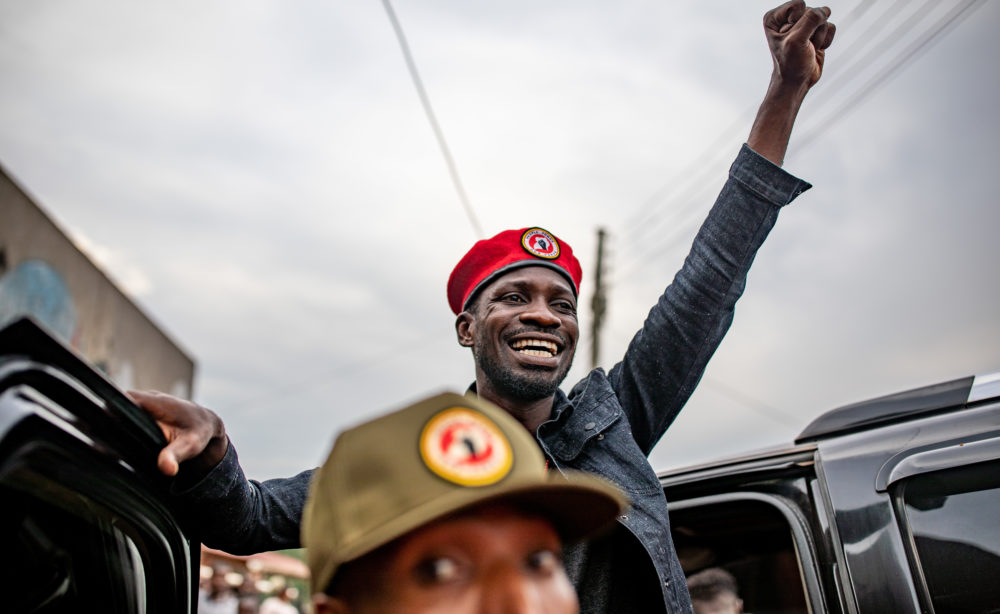News
Uganda: Bobi Wine takes on Yoweri Museveni with his songs of freedom
Wine has made himself a major thorn in the flesh of Uganda's Yoweri Museveni, who has ruled the country since 1986 — when Wine was just four years old — and he has paid a heavy price for choosing activism.

Bobi Wine’s Twitter account made for gruesome viewing this week. He posted a picture of the blood-soaked corpse of Dan Kyeyune with the words: “What a country! What a time! This evening as we returned from the burial of Ritah Nabukenya who was murdered by police yesterday, police & LDU shot at the crowd of people who were waving at me. Dan Kyeyune died on spot, others sustained severe injuries. It is totally dark here.“
Wine’s Twitter account has half a million followers. They used to follow him for his music, now they follow his campaign to pull Uganda back from the abyss as Yoweri Museveni’s 34-year-old presidency veers towards repression.
In an interview a week earlier in the Kenyan capital of Nairobi, Wine used a portable Bluetooth speaker to play his new song, United Forces of Change.
He mouths the words: “All of us must come together again, united forces of change – the only way we are going to get a liberation.”
Wine is disarmingly frank. “I’m not expert at anything. I find myself frustrated at what’s happening. I’m here to represent very many who are unemployed, very many who are excluded.”
Wine has made himself a major thorn in the flesh of Uganda’s Yoweri Museveni, who has ruled the country since 1986 – when Wine was just four years old – and he has paid a heavy price for choosing activism.
Speaking in an interview in the Kenyan capital of Nairobi, Wine explains how he was young when he became a music icon with legions of adoring fans who followed his style religiously.
“I saw the power of my music. I used to walk in a certain way and they all walked that way. I would drink a certain beer and all of them started drinking it.”
The money and adoration flowed, and Wine was living the rock ’n roll lifestyle, buying himself a Cadillac Escalade – a large American SUV favoured by hip-hop artists – with spinners on its wheel hubs.
“I was more or less what one could call ‘comfortable’, but it was an illusion.”
One evening, when Wine pulled up at a nightclub in the Escalade, he was confronted by angry youth. “This young man slapped me. He asked me why I was showing off when the country was suffering.”
Instead of dismissing his aggressive critic, Wine decided it was time he used his celebrity profile to fight against injustices in Uganda. His target was Museveni, who, after three-and-a-half decades in office, is becoming yet another African politician clinging to power even if it means undermining the democratic gains he initiated when he swept into office.
He enraged Museveni when he told an American audience that aid to Uganda was propping up an illegitimate regime.
Museveni cancelled his concert and told the BBC: “Mr Bobi Wine went to America and said that people should not come and invest in Uganda. That means he is an enemy of progress in Uganda.”
Wine is sticking to his guns. “The development partners should not just be doing things to maintain Museveni. Museveni presents himself as the anchor of stability. In my opinion, he is the anchor of instability.”
His opposition to the continued rule of Museveni is centred on his music. “I started to use my music to sing about injustice. I asked young people to run for office and I led by example. I had long dreadlocks. I cut them off. I put on a suit.”
While Wine had switched nightclubs for political platforms, he is disarmingly honest about his limitations.
“I see what the problem is. But the solutions? I have no idea,” he says, adding later, “I can offer a contribution. I certainly can’t solve all these problems.”
He says he would be willing to work with opposition leaders such as Kizza Besigye, the leader of Uganda’s Forum for Democratic Change, which has unsuccessfully contested elections against Museveni, including in 2006 when a court ruled there had been massive rigging and disenfranchisement.
“I’m nowhere compared to Dr Besigye when it comes to being presidential. In terms of experience, in terms of knowledge, he is far ahead of me.”
Wine says his strength is that he is the only leader who resonates with the country’s youthful population. Some 81% of Ugandans are under the age of 35, a figure which is high even on a youthful continent. Besigye “doesn’t spark the light in the young people”, he adds.
“I thought I would use my music to talk about things that should change. And it worked. It continues to work.”
Wine’s opposition has come at a price. “If I tweet that I’m going back (to Uganda), when I arrive, I will be bundled in a police car and driven at break-neck speed to my home.
“The police are going to be there to make sure I don’t say a word or that my name is not said on the microphone.”
By his telling, at one recent such gathering – a thanksgiving celebration for a relative who recovered from a health scare, he was called up to say a few words. Among those in the crowd was a senior Ugandan police officer.
“He stood up and declared the function illegal. He instructed everybody to leave the place. There was teargas.”
He has since been charged with “annoying the president”.
“President Museveni is clinging to power because that was his agenda – to use everything and everyone to hold on to power.”
Is he afraid? “Yeah, I live in fear.”
Wine’s role models are diverse: Martin Luther King, Mahatma Gandhi, and Barack Obama.
Front and centre is Nelson Mandela. “He stood up against a system that seemed all-powerful.”
This article was originally published on The Daily Maverick.



